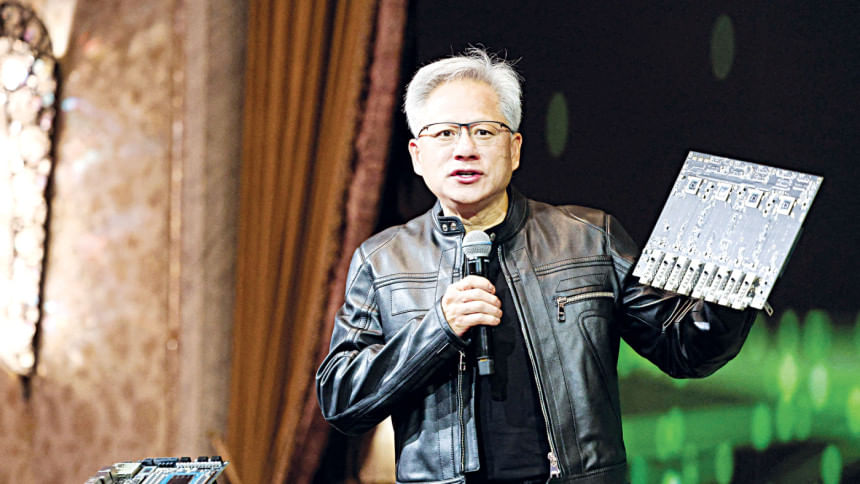China’s Nvidia pushback is only just beginning

China's relationship with Nvidia just got messier. Just one month after boss Jensen Huang's rockstar welcome in the People's Republic, state media has blasted the $4.4 trillion chipmaker's popular H20 processors over security concerns. Washington's latest plan to pocket 15 percent of Nvidia and AMD's high-end China sales will rankle Beijing even more. That puts customers like Tencent in an awkward spot.
Nvidia's lucrative ties with the world's biggest importer of semiconductors have been upended by the trade war, geopolitics and the broader US-China rivalry in artificial intelligence. In April, US President Donald Trump effectively banned the company from selling its China-specific H20 AI processor. That decision, which Huang said at the time would result in a $5.5 billion inventory writedown and $15 billion of lost revenue, was soon reversed as part of US concessions to Beijing in exchange for continued supplies of rare earths.
That's a huge relief to Nvidia. Sales in China are forecast to surge 185 percent to roughly $49 billion in the fiscal year to January, per Visible Alpha, and account for nearly a quarter of total revenue. Even that may be conservative: Trump on Monday said he was open to Nvidia selling a scaled-back version of its most advanced Blackwell chip to China.
But the outlook is darkening once again. Washington's July "AI Action Plan" called for, among other things, stricter enforcement of export controls including "new and existing location verification features". That prompted China's cyberspace watchdog to summon Nvidia to a meeting. Last week, the US company published a blog post in both English and Chinese reiterating that its chips did not have so-called backdoors, kill switches and spyware.
Those assurances have not been enough. A couple of weeks ago the state-owned People's Daily published an opinion piece titled, "Nvidia, how can I trust you?"; that was followed on Sunday by another commentary elsewhere which criticised the H20 as a threat to security, technologically not that advanced and environmentally unfriendly. Worryingly, it concluded that China "certainly had the option not to buy it".
It's likely the intended audience is the country's technology giants. Those include Tencent and TikTok-parent ByteDance, which are in the process of submitting applications for H20 chips, Reuters reported last month, citing people familiar with the matter. But Beijing is keen to wean the country off foreign technology and have them buy domestic offerings instead. Authorities have sent notices to companies discouraging the use of Nvidia chips, particularly for government or security-related applications, Bloomberg reported on Tuesday, citing people familiar with the matter. Moreover, Trump's latest 15 percent revenue collection deal will result in national champions indirectly handing money to the US government; that will not sit well with President Xi Jinping.
The problem is, domestic AI chips from Huawei, Cambricon Technologies and others still have a long way to catch up to Nvidia's. And Huang has another formidable edge: its programming platform, CUDA, hosts many apps, frameworks and AI software that have become the industry's standard, making it hard and costly for customers to leave. Chinese unease toward Nvidia will only rise, but the country does not have much choice for now.
Nvidia and AMD have agreed to give the US government 15 percent of revenue from sales to China of advanced computer chips like Nvidia's H20 that are used for artificial intelligence applications, a US official told Reuters on August 10.
The chipmakers agreed to the arrangement as a condition for obtaining the export licences for their high-end semiconductors, the Financial Times reported on August 10, citing people familiar with the matter. The report said the Trump administration had yet to determine how to use the money.
Separately, an influential Chinese social media account affiliated with the country's state broadcaster posted an article on August 10 that said Nvidia's H20 chips pose security concerns and are not technologically advanced or environmentally friendly. "When a type of chip is neither environmentally friendly, nor advanced, nor safe, as consumers, we certainly have the option not to buy it," the article concluded.
This follows earlier criticism of Nvidia by People's Daily, another Chinese state media outlet.
China's cyberspace watchdog said on July 31 that it had summoned Nvidia to a meeting, asking the US chipmaker to explain whether its H20 chips had any backdoor security risks - a hidden method of bypassing normal authentication or security controls. The US company responded on August 5 with a blog post in both English and Chinese reiterating that its chips did not have backdoors or kill switches.

 For all latest news, follow The Daily Star's Google News channel.
For all latest news, follow The Daily Star's Google News channel. 



Comments